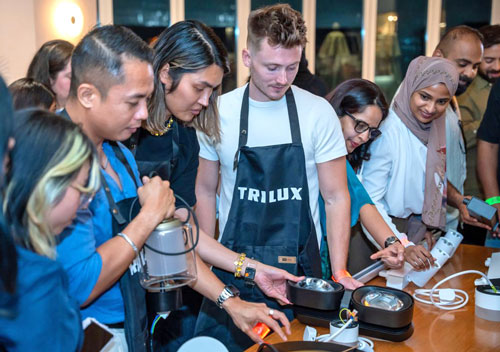Independent lighting designers have upcycled surplus and used luminaires in a unique event designed to raise awareness of the value in used products.
Organised by fixture manufacturer Trilux in association with the Lighting Institute, the Reworks Workshop brought together specifiers from 20 practices in the region.
They used a variety of paints and other materials to personalise and improve the lights.
‘We all know the story,’ Neethu Susan George of Trilux told the Circular Lighting Report. ‘Our offices are full of lighting samples. Functional, but slightly worn. A scratch here, a dent there. Many of them have probably seen more airports and car rides than we have! They still work perfectly well, but just because they’re not showroom-new, they’re cast aside.
‘What happens next? Most often, they’re discarded, or, if lucky, recycled. But even recycling has its downsides: components are disassembled, materials are separated, and the product’s original form and value are lost. Precious engineering and resources, reduced to raw material.
‘The seed of a different approach was planted during a conversation with a lighting designer, who didn’t want to part with a favourite luminaire, even though it carried dents and scratches, and was understandably upset.’
Trilux suggested that the designer simply paint it.
‘His eyes lit up at the idea. That moment made us realise how engaging and liberating such an approach could be. Most lighting designers are artists at heart, and even if we aren’t, there’s always an artist within us waiting to emerge.
‘That spark grew into an idea: What if we transformed this into a workshop that everyone could enjoy?
‘At Trilux, we asked a different question: Could these ‘retired’ luminaires become part of a broader conversation around circular design and wellbeing?’
Held on a Thursday to ease into the weekend, the workshop created a relaxed and creative atmosphere. A photo booth, food, drinks, and gaming tables completed the setting. Dr. Bhakti More, Head of the Centre for ESG at Manipal Academy of Higher Education (MAHE) in Dubai attended, further reinforcing the importance of ESG-aligned design thinking.

